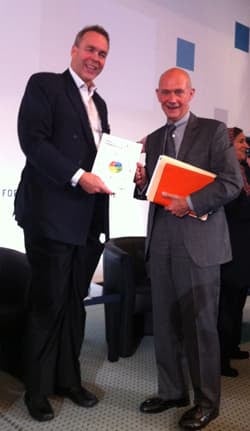 As the only corporate representative on the scene, Nick Staheyeff joined WTO Director General Pascal Lamy, the Trade Minister of UAE, former President of Switzerland and a Chilean senator, in opening the WTO 2012 Public Forum. This year’s Forum is entitled “Is Multilateralism in Crisis?” reflecting how the WTO’s trade liberalization efforts have ground to a halt as governments respond with protectionism to economic, social and environmental challenges. The WTO just downgraded its forecast of world trade growth from 3.7% to 2.5% for 2012. But eBay offers a glimmer of hope: “The world is changing, technology reduces the cost of distance, on eBay there's no distance,” said Pascal Lamy.
As the only corporate representative on the scene, Nick Staheyeff joined WTO Director General Pascal Lamy, the Trade Minister of UAE, former President of Switzerland and a Chilean senator, in opening the WTO 2012 Public Forum. This year’s Forum is entitled “Is Multilateralism in Crisis?” reflecting how the WTO’s trade liberalization efforts have ground to a halt as governments respond with protectionism to economic, social and environmental challenges. The WTO just downgraded its forecast of world trade growth from 3.7% to 2.5% for 2012. But eBay offers a glimmer of hope: “The world is changing, technology reduces the cost of distance, on eBay there's no distance,” said Pascal Lamy.
Nick explained to a full auditorium how eBay Inc., using technology, enables sellers of all sizes to reach consumers world-wide. The tools eBay offers in terms of search, rating, recommendations, dispute handling, secure payment, etc. reduce trading costs by approximately 60%. It matters less to buyers and sellers on eBay whether they are far apart geographically and whether one of them is from a country with poor governance or high corruption. Buyers and sellers use online tools to create trust in each other and in the transaction. Consequently, irrespective of size almost every seller on eBay export and the vast majority (about 80%) of US, French, UK and German sellers export to more than five countries.
Nevertheless, the volumes of exporting are still low and shipping costs, in the broadest sense so including delays and uncertainties, hit online traders more than offline traders. Nick pointed out how rules and practices relating to customs, delivery, consumer rights, etc. are not adapted to the smaller, less resourced, traders who with the help of the Internet and technology suddenly can become world stage players.
Pascal Lamy supported this description saying eBay is a very good example of how things have moved incredibly fast in some parts while the world hasn’t changed much in other areas, such as shipping and customs. He specifically pointed out that customs procedures haven’t “adjusted to the new world” and that the WTO needs to become “more aware of where we are behind.”
The WTO needs to find a way to not only break out of its own gridlock but to quickly start replacing trade barriers with practical solutions for SMEs. “Our business is moving so rapidly, we can’t wait”, Nick said, describing how eBay is developing a global shipping hub to assist international sellers overcome administrative hurdles. To remain relevant, Nick advised that the WTO ensures it is in a position to deal with the increased volatility we will see in society and the economy by being nimble and flexible.
UPDATE: In April 2013, Nick Staheyeff shared a report with Pascal Lamy providing more details on trade barriers discussed during the session and proposing areas for WTO action.